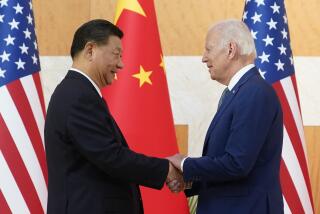China Censors Bush Speech in Print
- Share via
BEIJING — The Chinese government responded to President Bush’s call for religious tolerance Friday by promptly editing out his remarks on freedom and faith in its transcript of a speech that Bush delivered on live national television.
Before the U.S. leader had even boarded Air Force One to return to Washington on Friday afternoon, China’s state-controlled media put out their version of the morning address, in which Bush spoke to an audience of university students.
Almost half the speech--large chunks extolling American liberty and urging China to relax its political and religious restrictions--was simply hacked out in the transcript released by the official New China News Agency. The heavy censorship prompted indignant complaints on the Internet from people who demanded that the full text be restored.
“Why must the New China News Agency kid itself?” someone using the name Crawler asked in one chat room. “Does striking out someone’s words mean the person never said them?”
Others took to posting the censored portions for others to read. “The Chinese media always distort the facts,” another cyber-citizen wrote. “Everyone ought to compare the live remarks with the subsequent transcript.”
Bush’s speech at Qinghua University in Beijing, along with a half-hour question-and-answer session afterward, was broadcast Friday morning on China’s premier television channel, which reaches hundreds of millions of households.
It was only the second time an American president has had the opportunity of addressing the Chinese people directly, and one of Beijing’s most widely read newspapers publicized the event beforehand.
But the censored transcript demonstrated the ambivalence of the Communist regime toward the United States. Although top leaders publicly advocate stronger ties with Washington and agreed to the White House’s request for live air time, they remain sensitive to any criticism of their rule.
The excised portions of Bush’s speech contained praise for America’s civic spirit and its status as “a beacon of hope” for people around the world. Bush’s criticism of some Chinese textbooks’ portrayal of U.S. society also was dropped. So were his comments on his personal faith, his call for an end to religious persecution here, his description of the Statue of Liberty and his declaration that freedom need not mean chaos.
Even his praise for the courage of the firefighters and police officers who died trying to save victims of the Sept. 11 terrorist attacks on the U.S. got the ax.
One thing that remained was a brief civics lesson on the separation of powers in U.S. government and the fact that political authority derives from a “free vote of the people.” But Bush’s wish that the Chinese might one day choose their own national leaders was expunged.
Still, the speech did get beamed live and uncensored over the airwaves Friday morning, potentially seen by hundreds of millions of viewers.
And state-run media have spoken warmly of Bush’s visit as an important event in Sino-U.S. relations, even though the Chinese generally have been skeptical of Bush, whom they regard as less friendly toward their country than was President Clinton.
Talks between Bush and President Jiang Zemin were described as “positive, constructive and fruitful” by the Foreign Ministry, although no major agreements were reached. In addition, Bush had a chance Friday to meet Vice President Hu Jintao, who is expected to become president next year.
The two men spoke briefly before Hu introduced Bush to the audience at Qinghua. Foreign Ministry spokesman Kong Quan said Hu thanked Bush for an invitation to visit the U.S., which he has accepted.
After the speech at Qinghua, a school often billed as China’s MIT, some of those who attended gave Bush fairly high marks.
“I think Bush spoke well. Not that I agreed with everything he said,” said Zhang Kaicun, 49, a worker at Qinghua who was allowed to attend.
Bush’s comments about religious persecution in China didn’t ring true to Zhang. “More and more people are turning to religion in China. I know a lot of religious people,” he said. “They’re Buddhists, and they’re under no pressure whatsoever.”
During the question-and-answer period, the first two of six questions by students grilled Bush on his policy toward Taiwan, the biggest sticking point in U.S.-China relations. Beijing regards the island as its rightful territory.
The questions, both of them applauded by the audience, reflected the growing nationalism among Chinese youth, a sentiment actively fostered by the government. Four years ago, at a similar event, students at Qinghua’s rival institution, Beijing University, asked Clinton whether, beneath his smiles, the U.S. was intent on containing China.
On Friday, Bush said he is committed to helping Taiwan defend itself if attacked but stressed that he wants to see a “peaceful settlement” of the stalemate.
Student Zhang Jing said she found the response rather tepid. “It’s a diplomatic answer,” she said.
More to Read
Sign up for Essential California
The most important California stories and recommendations in your inbox every morning.
You may occasionally receive promotional content from the Los Angeles Times.














